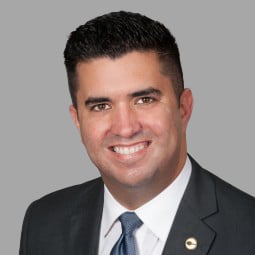Food, Flavor, and Cuban Culture

Danny Medina, Regional Vice President and General Manager for Sodexo Live!, is a first-generation American whose parents immigrated from Cuba. For Hispanic Heritage Month, he shared how his heritage influenced his life and career and the role food plays in bringing communities together.

Interviewer: What can you share about your own cultural identity?
Medina: My parents left Cuba in the 60s. My grandparents had to send their children off to better their lives. My mom came here first with her sister when she was 15. When you left the country, you had to return all your property because the government considered it theirs. My mom had a ring her great-grandmother gave her, and they wouldn't let her get on the plane without giving up that ring. That's her last memory of the country she was born in.
My parents worked hard here to provide my brother and me a good life. From an early age, we learned that the more you put in, the better the results will be. My grandma raised me because my parents worked so hard. Watching her cook sparked my interest in learning about our culture because I knew nothing about it. I just knew we were Cuban, and I spoke Spanish.
Interviewer: How did you get started in the hospitality industry?
Medina: Some of my family owned restaurants in Miami. At 12 years old, my uncle brought me under his wing. I spent summers washing dishes and chopping onions. I got more involved as I got older, learning how to serve, make purchases and orders, and helping my uncle transition from manual accounting and inventory. I loved growing up in that environment. But when the opportunity came up to join Disney's college internship program. I had to do it because you can't put a price on that training. That internship turned into a career. At the age of 19, I was a restaurant manager. Years later, I was part of the opening team for Hong Kong Disneyland.
When Sodexo Live! was awarded the contract at the Orange County Convention Center in Orlando, I took a leap of faith and took a role there in 2010. I spent eight years there and worked my way up from a banquet manager to Director of Operations. I had the opportunity to become the General Manager of the Miami Beach Convention Center in 2018, where the center underwent a massive $620M renovation over the course of five years. While there are still items on the punch list today, our hospitality teams and creative culinary talents led by Chef Ish are impressing our guests on a daily basis. I attribute my professional growth to the mentality my parents passed on: always looking forward, doing your best, and not giving up. It was their hard work that got me here.
Interviewer: What message would you like to stress for Hispanic Heritage Month?
Medina: When I think of Hispanic/Latin heritage, I celebrate what my community has brought to the culinary world, from ingredients like chocolate and chili peppers to some favorite dishes like ceviche and empanadas. When I think of our community's contributions, I always emphasize how we've enriched global cuisine.
At Sodexo Live!, we're committed as a company to celebrating tradition and heritage year-round. We can always do that and feel comfortable. It's not just one month, but having this time to emphasize it is fantastic.
Interviewer: What Cuban traditions have you shared with guests?
Medina: In Miami Beach, we have rituals around having Cuban coffee or 'cafecito.' You can drive around, and you'll see people from all walks of life, all generations, starting their day with a small Cuban coffee with so much sugar that it really gets you going. That's when you have conversations or catch up with a friend. In the office, you bring a colada, a Cuban espresso made with espumita (sugar foam). It comes with a little stack of white cups, and you can share it with your colleagues. It's the equivalent of bringing doughnuts to the office. The art of making it is not precise, but it's made with love.
We created a whole concept around colada in the Miami Beach Convention Center. It's so authentically Miami, and our clients and employees love it. Everybody on the team is not Cuban, but it's an institution in Miami. Of course, we also have the best Cuban sandwich, with pork that's slow-roasted for at least 24 hours, and the best Cuban bread. I love that Chef Ismael, the Executive Chef in the Miami Beach Convention Center, shares the same love for tradition. He's Puerto Rican, but at the end of the day, we're all passionate about our cuisine.
Interviewer: What role does food play as part of your cultural identity?
Medina: Food and flavor are an important part of Cuban life and culture. But at the core of it, we're all the same, right? Even though our cultures may be different, and the flavors are different. If you're in Alabama, they love Alabama white sauce. In Baltimore, it's crabcakes. It's the same thing in the Hispanic/Latin culture. We're passionate about food, and I think that translates wherever you're at.
Food is a universal language that breaks boundaries. It brings people together, sparks conversations, and allows us to appreciate each other's culture. Whether I'm making my grandma's recipes or having a coffee, it just keeps you grounded within your culture. Sometimes, you forget, but it's a bridge to my past and history.
